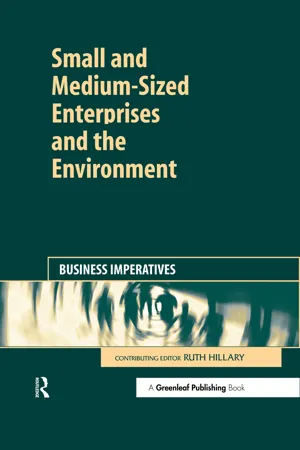
- 416 pages
- English
- ePUB (mobile friendly)
- Available on iOS & Android
About This Book
This book tackles a largely neglected topic: small and medium-sized enterprises (SMEs) and their environmental impact. Over 90% of all firms are SMEs. Their importance to the health of national and international economies is recognized. But what of their environmental impact? Individually, this may be small but, collectively, they pose a huge and largely unregulated threat to national and indeed the global environment. There have been many failed attempts to engage SMEs in environmental stewardship. Why is this? And where are the success stories needed to set best-practice examples? Environmental protection is widely touted as being a win-win scenario for business with economic spin-offs in terms of energy and waste reduction quickly producing payback for capital expenditures. Why is the "good environmental management equals good business management" message not getting through? In Small and Medium-Sized Enterprises and the Environment Dr Ruth Hillary brings together an outstanding international collection of experts from government, international and national support agencies, academics and the business community to present arguments about the key environmental business imperatives facing the small-firm sector. The book is divided into four sections: Attitudes and Perceptions of Small Firms to the Environment and SustainabilityEnvironmental Management in the Smaller FirmPractical Strategies for Reaching SMEsCase Studies from around the World.
In these sections, the book examines the threats – such as trade, supply chain issues and legislative compliance – but is also solution-oriented, with considerable discussion of the management tools smaller firms can use to improve their environmental performance. It aims to provide practical strategies for smaller firms and to that end includes a range of informative case studies from around the world. Small and Medium-Sized Enterprises and the Environment is the most comprehensive book on the subject available and will prove invaluable not only to SMEs themselves, seeking to understand a rapidly changing world, but to consultants and small-business advisors, local and central government and to all those in academia looking for ways to improve the environmental performance of small businesses.
Frequently asked questions
1
Attitudes and Perceptions of Small Firms to the Environment and Sustainability
1
Small firms and the environment
Methodology
- The perceived role SMEs play in the national economy and the local environment
- Ratings of the environmental performance of respondents’ own companies, and benefits of improved ‘green’ performance
- Which support bodies or initiatives have been or would be contacted?
- Awareness of environmental legislation
- Registration/certification currently held or planned
- Costs associated with environmental issues
- Which types of organisation or individual have enquired about the environmental performance of respondents’ companies, and which might cause changes to practices?
- Preferred format for supply of environmental information
| Number | |
| Number of employees | |
| 1–9 | 76 |
| 10–36 | 65 |
| 37–49 | 41 |
| 50-99 | 54 |
| 100-249 | 64 |
| Turnover | |
| £0–£249,999 | 33 |
| £250,000–£499,999 | 21 |
| £500,000–£999,999 | 19 |
| £1 million–$4.99 million | 89 |
| £5 million and over | 73 |
| Market sector | |
| Manufacturing | 141 |
| Construction | 14 |
| Service [including transport, wholesale/dealing/retail] | 133 |
| Region | |
| East Anglia | 11 |
| East Midlands | 21 |
| Greater London | 27 |
| North-East | 18 |
| North-West | 35 |
| Northern Ireland | 14 |
| Scotland | 22 |
| South-East | 49 |
| South-West | 48 |
| Wales | 7 |
| West Midlands | 30 |
| Yorkshire & Humberside | 18 |
Results
SMEs’ perceived role in the national economy and the local environment
Table of contents
- Cover
- Half Title
- Title
- Dedication
- Copyright
- Contents
- Foreword
- Introduction
- Section 1: Attitudes and Perceptions of Small Firms to the Environment and Sustainability
- Section 2: Environmental Management in the Smaller Firm
- Section 3: Practical Strategies for Reaching Small and Medium-Sized Enterprises
- Section 4: Case Studies from around the World
- Bibliography
- Biographies
- Abbreviations
- Index